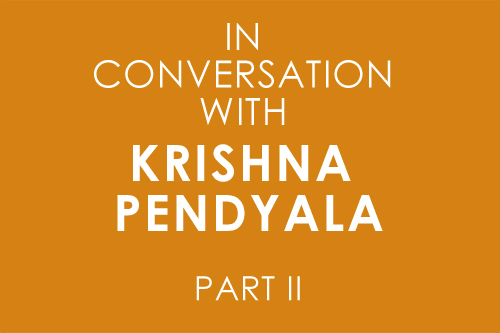 This week we’re featuring a series of five conversations between Rewire Me founder Rose Caiola and Krishna Pendyala, life coach and author of Beyond the PIG and the APE. Below is the second installment of the series.
This week we’re featuring a series of five conversations between Rewire Me founder Rose Caiola and Krishna Pendyala, life coach and author of Beyond the PIG and the APE. Below is the second installment of the series.
ROSE: I wanted to ask about the youthful idealism that you bring up in your book, Beyond the PIG and the APE.
KRISHNA: A lot of young people have idealistic views of the world, and I know I did. One was, If you do good, good things will happen to you. But that comes with an assumption that life is fair. And when it wasn’t, that really bothered me. Today I would say it bothered my young ego. I did what was right and I really got shafted. And I carried that anger and hurt with me, and it started to build because it wasn’t fitting my view of the world.
ROSE: Where do you think that belief came from?
KRISHNA: I have no idea. Fairytales, maybe? We don’t expose children to anything bad. We protect them—that’s the APE (Avoids Painful Experiences) in us as parents… I remember when I was working at Carnegie Mellon, the associate dean of the School of Design and I were working on a program with children and I made the comment, “That will confuse them,” and he said, “What’s wrong with that?” Whoa! This is how you learn. And boom! I learned something.
ROSE: You’re right. We do try to protect our children. We try to protect them from death, we try to protect them from pain, we try to protect them from being bullied. Not that we want them in harm’s way, but we don’t know how to teach them in an effective healthy environment about these natural occurrences.
KRISHNA: But if we did, it would make them more resilient. My wife and I no longer have this argument because I asked her, “Would you like our children to fall in college or would you like them to fall when we can help them and pick them up?” Her answer was obvious. I fell in college. I was raised overly protected by a home economics mom and a dad who was ultra-protective, and every mishap that happened was when I was in college.
If you’ve never fallen, if you’ve had an almost perfect life, the better learning comes later and is often a lot tougher. The first thing I had to learn is that success was something I define for myself. My life is going to be measured by me, not by others. And once you get that, I think half the battle is won. The other half is managing or learning to live with your ego.
ROSE: How do we do that?
KRISHNA: Many, many people will say to slay the ego, like a dragon. That, I think, is just ego coming into your life in another way. Better to acknowledge that it exists: “I have an ego.”
When you publish this interview on Rewire Me, you’ll introduce my ego, you won’t introduce me, because most of the time one introduces the ego. “Krishna is this, Krishna is that…” That’s my ego; that is not me.
I tried to introduce my [true] self once, and it didn’t work very well. I went to a networking event. I was one of the charter members. And somebody asked, “What do you do?” And I said, “I’m just a regular guy trying to make a living and raise a family.” And he looked at me so weirdly because he thought I was being a smartass, which I wasn’t. It was a fairly appropriate answer to the type of question he asked, but it was not an acceptable answer.
ROSE: It’s not an acceptable answer because it’s not what they’re used to.
KRISHNA: Precisely right. It goes back to the ego. The identity that the mind creates for us to show up in this world is the ego. So if you are going to play in the world, you’re going to have that identity, and as soon as you acknowledge you’re going to have it and you’re going to live with it, it’s easier.
ROSE: I’m working on a book, and before I launched Rewire Me, people kept asking, “Well, who are you?” They didn’t want to publish my book because I wasn’t famous. And I looked at them and said, “I’m just like you. And I am like everybody else who is in this room or going to read this book. My life is not anything special or different from anyone else’s, so I’m representing everyone when I’m presenting this book.” Is that also the ego?
KRISHNA: No. You didn’t have a strong ego in that situation. You were saying, “I am one among you and I have something to say and I think people will listen. So I would like to share it.” On the other hand, if you had said, “I am Rose Caiola, the founder of this and the achiever of that and this is how much money I made and these are the accolades I have, and I went to Princeton, I went to Harvard, whatever—therefore you need to hear what I have to say.” That would be ego. Interestingly, people do want that, though. It’s a two-way street. So sometimes you have to do that just to cut through the noise. That’s the monkey mind talking.
And I can tell you one story you heard in my TEDx talk (below). My daughter—she was only eight at the time and we had introduced the notion of the monkey mind to her—and she came in and said to me, “Papa, is it my monkey mind that is telling me that I’m ugly?” And this girl, she is a beautiful young girl… At first, I was speechless. You don’t even know where this kind of question comes from. And then my natural response was, “Sweetheart, who else could say something like that?” And that was the end of that conversation. She pranced off.
This was not a debate, no drama, but a huge learning moment for her, and it stuck with me. I told myself, all this work I’ve done is worth it.
ROSE: Do you think there is a way that we could change that for our children? That we could change that monkey-mind thinking?
KRISHNA: I don’t think we should say change. I think, if I may use the word, it becomes all about controlling the monkey. The monkey will be a monkey. I think that is really key. Because when you acknowledge that the monkey exists, it will play tricks, you can enjoy the tricks. But if you get caught up in the tricks, it will trick you and make a monkey out of you.
Tomorrow, Rose talks with Krishna Pendyala about intuition.
Related Articles
- Editors’ Pick: Beyond the PIG and the APE, by Krishna Pendyala
- Conversations with Krishna Pendyala (Part I): On animal acronyms, self-esteem, and delaying gratification
- Conversations with Krishna Pendyala (Part III): Distinguishing between intuition and instinct
- Conversations with Krishna Pendyala (Part IV): Three levels of choice
- Conversations with Krishna Penyala (Part V): The Mindful Nation Foundation




2 Comments
Kelly Lau
What an intriguing 2nd interview! I feel that I have been living that notion of “If you do good things, good things will happen to you, up until this very moment!
I’m looking forward to the next conversation with Krishna Pendyala…
Thank you.
Angie P.
Thank you, I have enjoyed the first two conversations and I’m looking forward to the rest.